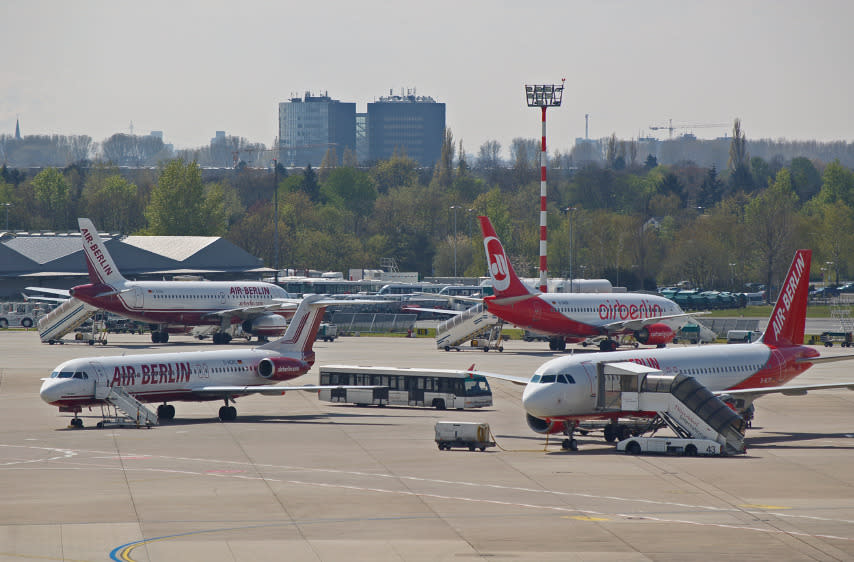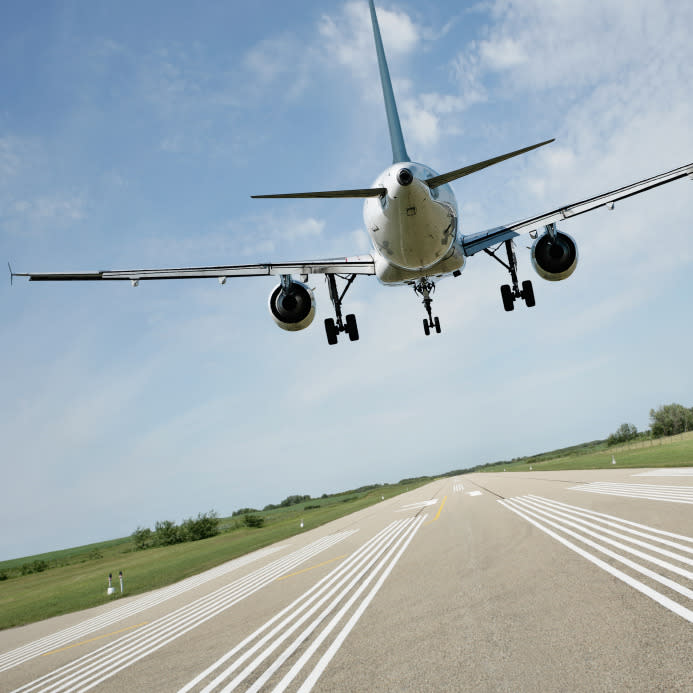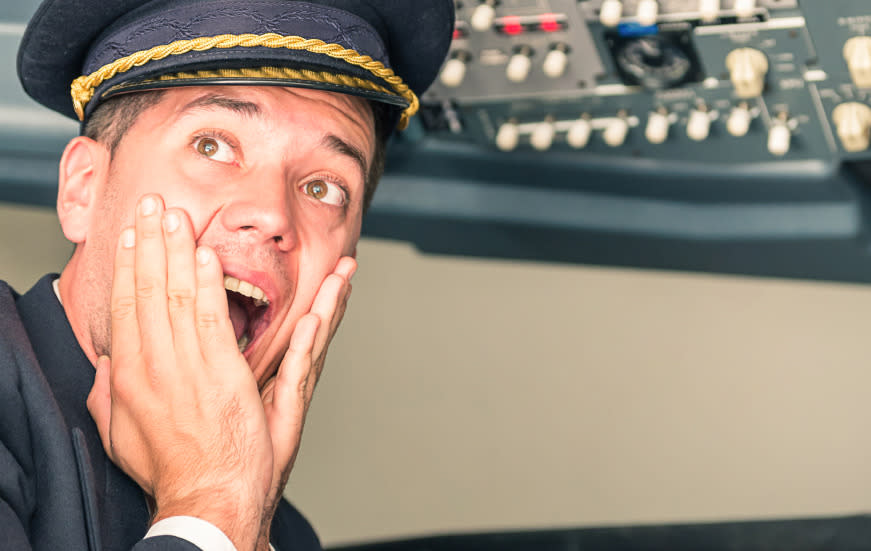Airplane Noises That Should (and Shouldn’t) Freak You Out

Some nervous fliers drive themselves (and others) crazy sitting around listening for noises that might indicate a problem. (Illustration: iStock)
It is the identifying cry of the Nervous Flier in his/her natural (and frightened) habitat: “What was that noise?”
Some travelers spend entire flights in a constant state of worry over the many noises they hear from the average passenger jet. Every bump, whir, bang, and thump is enough to send these people into a “We’re all gonna die!” fear spiral — even though precious few of us know exactly what those noises may mean.
Related: Can Sex Cure Your Fear of Flying?
Now airplane noises have become a hot new discussion topic. Two Boeing mechanical engineers discussed it last week in a high-profile Q&A session on Quora.
Yahoo Travel turned to veteran airline pilot turned licensed therapist Tom Bunn, who works with people afraid to fly. He tells us what many of these noises mean and what you should (or shouldn’t) be afraid of.
Those plane-specific noises

Noises vary from plane to plane. (Photo: iStock)
One reason passengers have a hard time interpreting the meanings behind different noises is that the sounds vary from plane to plane.
Related: What Really Causes Plane Crashes? (It’s Not What You Think)
“The Airbus A320s have an odd noise during taxi that some say sounds like a sick dog,” says Bunn. In contrast, “the Boeing 747 nose wheel makes a moaning noise at times when turning. First time I heard it, I was sure something was wrong, but it is actually normal for the 747.” Look at it this way. The beautiful purr of a Porsche’s engine sounds remarkably different from the clunky rattle of a 1975 Volkswagen Beetle, even when both cars are running smoothly. Same with airplanes.
That post-takeoff thump

This is where that thump comes from. (Photo: iStock)
Sometimes right as a plane takes off, you might hear a disconcerting thump. It doesn’t happen all the time, and its irregularity sometimes freaks people out. “Since a passenger rarely will hear it, if they do, they naturally think something might be wrong,” says Bunn.
Related: No-Fly Zone? Most Dangerous Places for Air Travel
Well, there’s nothing wrong. That noise you hear is from the landing-gear struts that act as a shock absorber. “When the plane lifts off the runway, the strut extends fully, to its limit” as the wheels suddenly bounce off the ground, explains Bunn. “Sometimes, if a person is sitting right over the landing gear, there is a thump if the strut quickly extends.” The thump happens only when there’s a fast and relatively sudden liftoff, but it’s nothing to worry about.
That running-water noise

Sometimes you can hear a plane’s hydraulics system at work. (Photo: iStock)
You might get this as the landing gear is retracting soon after takeoff. “If sitting near the [landing] gear, a passenger may hear something that sounds like water running through a pipe,” says Bunn. “That’s close; it is hydraulic fluid running through the hydraulic system lines and cylinders” as the landing gear is being retracted. At the end of the process, you might here a clunk. That’s the landing-gear doors closing.
That scary non-noise

If the engine gets quiet right after takeoff, don’t worry. (Photo: iStock)
This might make you nervous: As the plane lifts off, you might hear the engines quiet down. Before you go pressing the Call button to alert the crew to an engine stall, keep in mind that this is normal too.
Related: In the Wake of Recent Plane Crashes, How to Ease Fear of Flying
“As the plane leaves the runway, and the distance from the plane to the runway increases, the reflected sound [from the engines] lessens slightly,” says Bunn. “The engines are making the same amount of noise, but as the plane lifts off the runway, the amount of noise reflected back to where the passenger can hear it is less. So the engines sound quieter. A person could think the engines are losing power just as the plane is leaving the runway. Not so.”
The many landing noises

Landing a plane can be noisy. (Photo: iStock)
“When the flaps are retracted after takeoff (or extended for landing), there may be noise; on most planes, it sounds like a blender running for four seconds,” says Bunn. Or “there may be a brief rumbling sound when the flaps change position, as the change in flap position changes the air flow. On large airliners, when full flaps are used for landing (most landings use less than full flaps), the flaps cause a continuous rumbling sound. All these sounds are normal.”
The three (probably) bad noises
While there are a lot of noises that are no big deal, there are a few that might be worthy of concern. They aren’t clear-cut signs of danger (in fact, they often turn out to be nothing). But if you hear them during your flight, you might not be 100 percent paranoid to think that all may not be 100 percent right.
Problem noise No. 1: A bang
A bang preceded the recent fire aboard a British Airways plane in Las Vegas. (Video: ABC)
“A bang, or sound of an explosion, can be semi-normal or an indication of a serious problem,” says Bunn. He points to the recent engine fire aboard a British Airways jet preparing to take off from McCarran International Airport
in Las Vegas (the plane was safely evacuated, and 14 passengers suffered minor injuries). In an ABC video taken by a passenger (see above), you can hear the faint sound of a bang as the engine catches fire. “If an engine explodes as the BA engine did in Las Vegas, it causes a bang,” says Bunn. “That is serious.” But Bunn points out, pilots are well trained in how to handle these incidents: They shut down the engine.
Related: 10 Most Terrifying Runway Close Calls
That said, don’t go freaking out every time you hear a bang on a plane; it can mean something other than an engine fire. “A bang can be a ‘compressor stall,’” says Bunn. He explains: “The speed of the engine changes on a plane, of course, as the speed of an engine does on a car. But with a jet engine, the pressure inside the engine needs to be regulated within a certain range. Otherwise, the engine belches … and when this happens there is a bang.” Bunn explains that happens because one of the valves that is supposed to open or close to regulate air pressure inside the engines did not do its job. “As a result, too much pressure built up inside the engine, and it suffered indigestion,” he says. In other words, the bang you hear in this case is an engine burping. And just like with a person, the burp is harmless.
Problem noise No. 2: Fire alarm

An engine fire leads to an alarm in the cockpit, prompting the pilots to take quick action. (Photo: iStock)
If there is an engine fire midflight, an alarm may go off — but only in the cockpit, not the passenger cabin. “You wouldn’t hear it unless you’re really close to the cockpit,” says Bunn.
Related: Watch GE Test Its Jet Engines for Safety by Putting Them Through Hell
And you wouldn’t hear it for very long. “As soon as [the alarm] gets their attention, the pilot pushes a button to silence it so the noise doesn’t distract them,” Bunn says. “And then they go about shutting down the engine and firing the fire extinguisher into the engine.”
Problem noise No. 3: The crew freaking out

You will never see this. (Photo: iStock)
OK, that’s a bad sign.
That last item may sound flippant, but it brings up an important point. The many different noises an airplane makes likely aren’t bothering the crew, so they shouldn’t bother you. Remember, the crew knows a lot more about this stuff than you do. “When a passenger hears a noise and thinks it means danger, they will be wrong 99.999 percent of the time,” says Bunn. “In that 0.001 percent of the time they are right, they are not in a position to do anything about it. Reporting it is of no use because the pilots will know of it just at the same moment the passengers do.”
So at the end of the day, not only is listening out for dangerous noises bad for your peace of mind, it’s pointless too. “A passenger who listens for noises, hoping to figure out if the plane is about to crash or not, is looking for trouble, obviously, and will find it,” says Bunn, “even when it doesn’t exist.”
So next time you fly, instead of listening for noises, put on a pair of headphones and listen to the in-flight movie. Or the music on your phone. Or even the travel stories of your seatmate. Let the crew be the ones listening out for trouble. “You really don’t need to worry [about the flight] if you’re not getting paid for it,” Bunn laughs. “Let the guys who are getting paid do the worrying.”
WATCH: A Broad Abroad — Seeking Mongolia’s Secret Natural Wonder
Let Yahoo Travel inspire you every day. Hang out with us on Facebook, Twitter, Instagram, and Pinterest. Watch Yahoo Travel’s original series “A Broad Abroad.”

